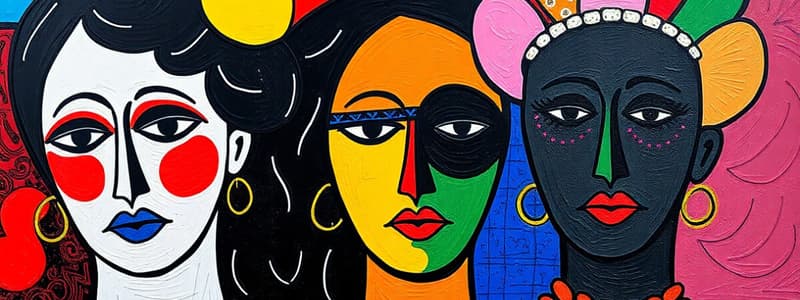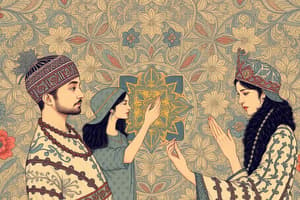Podcast
Questions and Answers
Which scholar criticized mass culture for being inauthentic compared to folk culture?
Which scholar criticized mass culture for being inauthentic compared to folk culture?
- Livingstone
- Straniti
- Mac Donald (correct)
- None of the above
Straniti believes that mass culture negatively impacts consumers and drives down cultural standards.
Straniti believes that mass culture negatively impacts consumers and drives down cultural standards.
False (B)
What did Livingstone (1995) find regarding TV soap operas?
What did Livingstone (1995) find regarding TV soap operas?
They saw positive benefits for society.
Mac Donald criticized mass culture for being __________ compared to folk culture.
Mac Donald criticized mass culture for being __________ compared to folk culture.
Match the scholars with their views on mass culture:
Match the scholars with their views on mass culture:
What are subcultures typically characterized by?
What are subcultures typically characterized by?
Folk culture is primarily created by external artists for public consumption.
Folk culture is primarily created by external artists for public consumption.
What is a real-life example of folk culture mentioned in the content?
What is a real-life example of folk culture mentioned in the content?
Bourdieu argued that the dominant class imposes its idea of ____ and ____ taste.
Bourdieu argued that the dominant class imposes its idea of ____ and ____ taste.
Match the following cultural terms with their definitions:
Match the following cultural terms with their definitions:
Flashcards
MacDonald's view of mass culture
MacDonald's view of mass culture
MacDonald criticized mass culture, seeing it as inauthentic and driven by profit, contrasting it with the perceived authenticity of folk culture.
Straniti's view of mass culture
Straniti's view of mass culture
Straniti argued against the negative view of mass culture, stating it has value and deserves study; He opposed a singular mass audience, arguing for diversity in consumer choices.
Livingstone's perspective
Livingstone's perspective
Livingstone found positive social aspects in popular culture noting that TV soap opera producers saw the benefit to society.
Folk culture
Folk culture
Signup and view all the flashcards
Mass culture
Mass culture
Signup and view all the flashcards
Subculture
Subculture
Signup and view all the flashcards
Subculture of resistance
Subculture of resistance
Signup and view all the flashcards
Folk Culture
Folk Culture
Signup and view all the flashcards
High Culture
High Culture
Signup and view all the flashcards
Mass/Popular/Low Culture
Mass/Popular/Low Culture
Signup and view all the flashcards
Bourdieu (Marxist Perspective)
Bourdieu (Marxist Perspective)
Signup and view all the flashcards
Study Notes
Subcultures
- Subcultures are groups within larger societies with unique beliefs, values, and lifestyles.
- Some subcultures, like those of ethnic minorities, may actively resist dominant culture, termed "subcultures of resistance."
- Examples include skinheads and punk rock.
- Willis (1977) studied working-class lads who resisted school culture.
- Hall and Jefferson (1976) viewed youth subcultures like skinheads as a form of resistance.
Folk Culture
- Folk culture is created by local communities, rooted in their experiences and traditions.
- It involves active participation, not just consumption.
- Examples include traditional music, songs, and dances passed down generations.
- Nottingham Hill Carnival is an example.
High Culture
- High culture is considered superior, emphasizing lasting artistic and literary value.
- It's often associated with intellectual elites and upper classes.
- Examples include theatre, opera, ballet, jazz, and Shakespeare.
Mass, Popular, and Low Culture
- These terms are often used synonymously, contrasting with high culture.
- "Low culture" is a derogatory term suggesting inferiority.
- "Popular culture" is a less negative alternative.
- Mass culture is a product of industrial societies, commercially produced for profit.
Bourdieu - Marxism
- The dominance of high culture stems from the controlling class imposing "good taste."
- Others are socialized to accept this hierarchy despite engaging in popular culture.
MacDonald
- Criticized mass culture for being inauthentic, contrasting it with folk culture's authenticity.
- Mass culture is seen as commercially driven.
Straniti - Postmodernist
- Argues mass culture has value and deserves study.
- Challenges the notion of a passive mass audience.
- Sees diverse choices and critical responses within mass culture.
Livingstone (1995)
- Studied TV soap operas as popular culture, noting potential societal benefits.
Studying That Suits You
Use AI to generate personalized quizzes and flashcards to suit your learning preferences.




